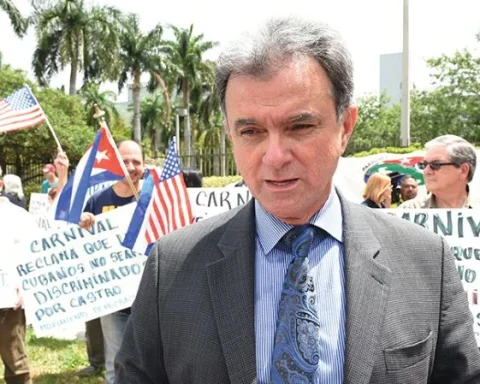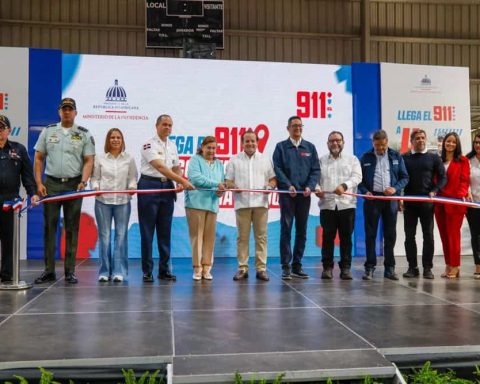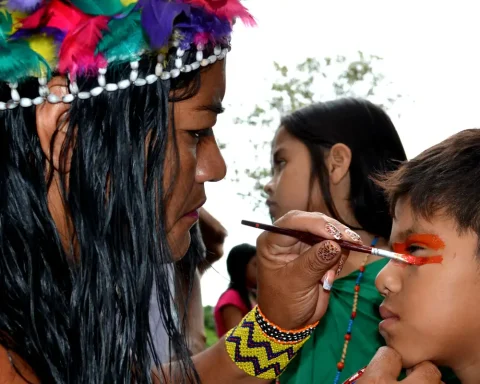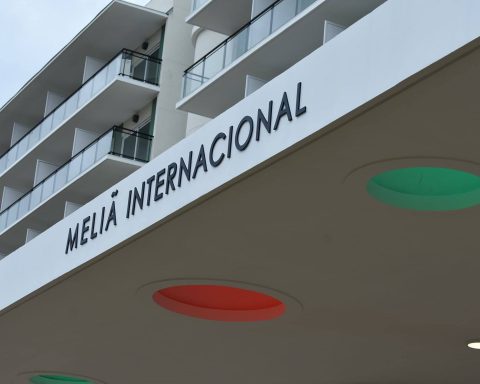-I live in fear that they will knock on the door and it will be the carabineros who come to tell me that they murdered my daughter Karla, who was found dead, dismembered somewhere. She kept thinking that when she was clean she told me that sometimes at night she slept under cars to protect herself from being raped.
Gretel Neira (56) is a seamstress and a neighborhood leader of a takeover in Alto Hospicio. She is the mother of six children, grandmother of six grandchildren, she is in charge of three of the five children of Karla (29), the penultimate of her offspring. “She was my precious little princess, a gift from her older brothers, until she fell into drugs and she began to disappear as a person, to become nothing. She does not accept her role as her mother, daughter, sister, and has devastated the family. It is terrible to see how someone you gave birth to, educated, tried to protect, is being destroyed day by day. She breaks your heart.
-How did your deterioration process begin?
-It started with not wanting to go to class. Eight times I enrolled her in eighth grade: eight times! She never finished school. Later she said that she wanted to work, to earn her money. Then she got pregnant. Thank God, my first two granddaughters have had excellent fathers, men who have cared for their daughters and have distanced themselves from Karla and our family; I understand that they want to protect the girls. I do not blame them.
She says that when the second of the girls was little, almost a newborn, Karla disappeared. “She no longer lived with me, but with the father of her daughter, but she left. She left them both. I made the complaint for alleged misfortune in Carabineros, I upholstered signs with his photo Alto Hospicio, I made calls on Facebook. She was then 24 years old. One day they called me from Arica, from the hospital. So I lived in the socket, in the lower part. It was before we were evicted and relocated up here, but I still managed and went looking for her. I found her pregnant again and with an extreme level of consumption. Very thin, her face had been transformed, her hair, the way she spoke. I brought her to the take, where she was living with me for a while. She seemed to be getting better, but she started fading again. She would go away for two days and come back. When her third child, Gerson, was born, she didn’t even know about it because of how blown away she was. She was living in a ruco, consuming base paste, which is why, doctors say, Gerson was born with Poland syndrome, a disease of the chest muscles. Luckily, someone reported her and an ambulance picked her up and took her to the Iquique hospital. That’s why they called me.”
Gretel put clothes in a bag and went to the rescue. “It made me so sad to see her lying on a bed like a dead person, like a ghost. And my grandson next to me, in a crib, covered with gray blankets. I hugged her and told her that we would go home, but a social worker told me that the child would remain under the custody of Sename. I said that I was not going to allow that, that I was his grandmother and that he would hold me responsible. My desperation was so great that the same social worker took me to the Family Court. That’s how I managed to get custody of Gerson.”
Gerson is 5 years old today and he calls her “mom”. She adores him. And she wakes up for him. “Karla was just a week with us. One night I heard her yelling at the boy, blaming him for her problems. I went and took it off. In the morning, she was no longer in the house. She disappeared for six months and that’s terrible. It is terrible that the daughter of your heart disappears like that and to know that she is killing herself little by little. Seeing that her son does not see her as a mother and knowing that she is not receiving that affection that could strengthen her and save her… ”.
Positive addicted children
After a year of absence, Karla reappeared.
-One day he arrived by vehicle. They left her in front of my door: she was three months pregnant and she was expecting twins. Wow, it was awesome. Too strong for me. I thought: “I can’t take charge, I’m not capable, I’m 50 something years old, I’m sick with a lung disease”, but then I felt that I’ve always known how to get ahead, that I can, so I accepted her back. When she was in the sixth month of her pregnancy, she ripped out of me and ended up in the hospital. The children had symptoms of wanting to be born, but they held them back a little longer, so that their little lungs could mature. At seven months, the twins, Karka and Jorgito, who are now 3 years old, were born. She had started again and consumed, and was admitted to the hospital very aggressively before delivery. I begged the doctor to operate on her. That she tied his tubes, despite his 27 years, to her youth. I explained that I couldn’t keep raising more children. I told her that I would stay with the twins, but that I couldn’t take it anymore, and that, if we left her like this, in a year, another would arrive; the next, another and so on… Karla gave her consent and they sterilized her. I think it was the right thing: children do not have to come into this world to suffer.
-Karla has never had treatment for her problematic drug use?
-It is very difficult to access treatment here in Alto Hospicio, and it becomes more difficult if someone who is of legal age, like her, does not want to be treated. They always ask for that will and a period of abstinence, if not, there is no case. I have looked for options, because it is not about arriving and admitting her. One option they gave me was to put her in a psychiatric hospital to detoxify her, but I didn’t think so; There are people in there with all kinds of problems. Searching here and there, I found a treatment outside the region, in a religious compound in Puerto Montt. At first, when I proposed to her, she totally shut down. But I threatened her: I told her that I would close the doors of my house to her and not allow her to see the children if she did not go inside. He had to pressure her somehow.
Finally, Karla agreed to treatment. The pastor of the evangelical church on which the therapeutic center in Puerto Montt depends came to look for her in Alto Hospicio. Gretel worked like never before to collect the money for the ticket.
“I made and sold masks because the pandemic was starting and it had to be sent to the other side of Chile. It was not easy; I had lost my work and I had to take her things: warm clothes and all that. She spent a total year in Puerto Montt, the first three in total isolation. Incommunicado. I talked to the pastor and he informed me of the evolution. When I was able to talk to her, he could be heard and seen well. She had regained weight, she had more color, not that grayish skin tone that the pastabaseros grab. When she came back, she was very good, we even put together a stamping project together. She started dating a very nice guy, a chef. He loved her very much and she told me that they would rent a house to start a family with them and the twins. I agreed, on the condition that I would continue to supervise the twins.
Gretel had them enrolled in the Camino al Sol Kindergarten of the Hogar de Cristo, in the heart of Alto Hospicio, despite how remote it remains from the intake where they live. Gersoncito had been there, as he calls the child in his eyes, and he fully trusts the educators. With those clear rules, Karla left with the illusion of leaving again.
-One day they called me from the garden to let me know that Karla had not gone to look for the twins. I thought that she might have had an accident and went looking for them, trying not to think that she might have relapsed, blocking out that terrible thought and praying that it wasn’t. But she herself called me to tell me: “Mom, I sent myself a shit: I’m using again”. And she cut me off. After a week, she came to pick up her clothes. Angry, so no one would tell her anything. She assured me that she would get better on her own. There I decided that for my mental health and the well-being of the children, I had to let her go. I don’t want to go into a depression, I don’t like getting sick and the little ones need me. They only have me and I need to be okay for them.
You are very angry with your daughter. Do you blame her or try to understand her?
-I don’t blame her, although I do to the extent that she tried and fell into drugs. She is the daughter of an alcoholic father. That gene is in her DNA. She was positively addicted to alcohol and stuck to drugs, not drinking. My grandchildren are passive drug addicts, because they consumed it through her during the pregnancy stage, and for this reason, I must be attentive, always take care of them. Prevent them from falling, as her mother fell. You know? I stayed whole nights talking with her, encouraging her, showing her my love in all her forms, but something was missing from her. I question myself all the time in my role as a mother, I analyze myself, I think what I did wrong.
-How do you see the future? Do you have hope that he will recover?
-As I told you: my greatest fear is that they will come to tell me that Karla was found dead, stabbed to death in the street. She is part of my soul, a piece of my sky, and I fear that she may come that day. I haven’t seen her in months. Some neighbors here in the camp have told me that they have seen her cleaning windshields in the corners, they have even sent me photos of her. She is skinny, emaciated. She sometimes calls to tell me she’s coming, but she doesn’t. Or that she loves me. I love her very much and I feel powerless, powerless, to get her out of that black hole where she has gotten herself. No one imagines what I suffer for her.
case analysis
“The strength and courage of that grandmother who does not die for raising her daughter and grandchildren is impressive, when many of us would have already lowered our arms and, at the same time, it generates outrage at the response of the State for women who present problematic alcohol consumption. and other drugs. The therapeutic offer for them is very deficient and even non-existent in some regions of the country”, says Carlos Vöhringer, psychologist in charge of problematic alcohol and other drug use at Hogar de Cristo.
According to official figures from Senda, during the year 2021, about 650 thousand people between 12 and 64 years old were in a situation of problematic consumption. Of the women, about 28,000 declared they needed treatment, however, only 6,000 women accessed some type of care. This gap is historical in many regions of the country. There is a lack of specific programs for women that are flexible and have a gender perspective. That they offer the possibility for women to be with their children of pre-school age if they require it and with housing and work support upon graduation from the program, which is essential.
“This lack in our public policy made Gretel look for an alternative for her daughter more than 4 thousand kilometers away with the consequent uprooting and the impossibility of being able to visit her. Along with the challenge of offering therapeutic programs for women, they also have to overcome more barriers to access treatment than men. They have the responsibility of caring for the home and children, associated with gender, and strong feelings of guilt and anxiety. The double stigma or social rejection of using drugs and being considered bad mothers often hides the problem and delays treatment. Coupled with this is the fear of losing custody of their children if they make their problem public.”
Carlos Vöhringer points out that if you or someone close to you needs an orientation space on this subject, you can communicate free and confidentially to the number 1412, which is the Alcohol and Drugs Phone of SENDA, which is available 24 hours a day for seven days. of the week, using a cell phone or fixed network.
eloquent numbers
According to the latest semi-annual report on treatment programs for alcohol and other drug use by SENDA, the distribution by sex of the people served is divided into: 7,426 men (68.7%) vs. 3,385 women (31.3%).
Among the reasons for the lower presence of women, a study published by PATH in 2016point out that the treatment model and the tendency of women to go more to health services than to drug addiction devices have an influence.
The therapeutic program that Hogar de Cristo has in Quilicura is one of those exceptional spaces where women of high economic vulnerability with young children and severe problems of alcohol and other drug use are received.
From May 2017 to March 2022, it has served 74 women. Thirty-two of them have graduated with therapeutic discharge their objectives fulfilled. Nineteen of them have been referred to other facilities, such as outpatient centers, that can better respond to their needs. Fourteen have abandoned the process. Nine have withdrawn for other reasons.


















